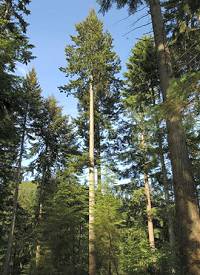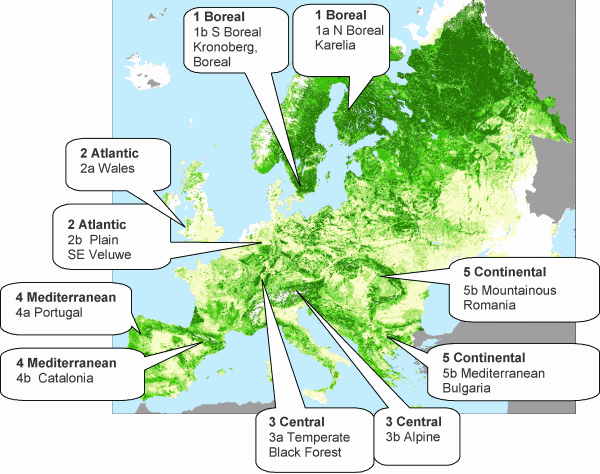Summary
Developing new management practices, so forests thrive in the face of climate change
Summary
 This project used climate data to forecast the ranges of European tree species under different climate change scenarios. Researchers then identified the main threats to forests and assessed how they might adapt to different climatic conditions. Forest Research worked with 20 other partners from 13 countries to develop the project’s main output: a decision support system for adaptive forestry planning.
This project used climate data to forecast the ranges of European tree species under different climate change scenarios. Researchers then identified the main threats to forests and assessed how they might adapt to different climatic conditions. Forest Research worked with 20 other partners from 13 countries to develop the project’s main output: a decision support system for adaptive forestry planning.
- Ten regional case studies on the impacts of climate change on distinctive forest areas across Europe, including the Gwydyr and Clocaenog forests in North Wales – significant reductions in timber yield forecast for southern Europe
- Mapping the future ranges of European tree species – smaller ranges for valuable timber (e.g. Norway spruce and beech), spread of less valuable, slow growing trees such as sessile or pedunculate oak
- Evaluation of a forest’s adaptive potential – natural genetic variation means some trees could actually fare better in warmer conditions, so seed transfer programmes could maintain sustainable levels of forest productivity and preserve ecosystems
- Preliminary risk simulations and forecasts for wind damage and bark beetle attack on a European scale
- Modelling adaptive forest management – robust simulations reveal the most appropriate adaptive forest management approaches (e.g. species diversification, short-rotation forestry, low-impact silviculture) for future climate scenarios across Europe
- A decision support system – tools and models to help forest planners balance economic, environmental and social objectives, despite the uncertainty of future climate conditions
Forest Research’s contribution to MOTIVE
Forest Research contributes to all parts of the MOTIVE project, leads activities on ‘Assessment of abiotic and biotic risks’ and ‘Stakeholder interactions’, and will work, in particular, on growth and risk modelling and social science tasks within the project.
Forest Research activities are focused on a ‘Regional case study’ of forest areas of Wales. This is one of 10 regional case-studies across Europe that cover major forest types and bioclimatic regions within the EU. This case study will initially concentrate on using available tools and models to help integrate climate change adaptation into local forest planning in Gwydyr and Clocaenog forests in North Wales.

Funders and partners
![]()
Forest Research activities in this project received 75% funding through the EU Seventh Framework Programme (FP7), and 25% from the Forestry Commission.
Forest Research was one of 20 European partners and the only partner from the UK. Other partners included research institutes and universities from Austria, Bulgaria, Czech Republic, Denmark, Finland, France, Germany, the Netherlands, Portugal, Romania, Spain, Sweden, and Switzerland.
Status
2009-2013
Contact
For further information please contact:
General Content
What’s of interest
European Research Framework Programme:
Research on Climate Change (PDF-7780K)
Prepared for the Third World Climate Conference (WCC-3) and the UNFCCC Conference of the Parties (COP-15)
